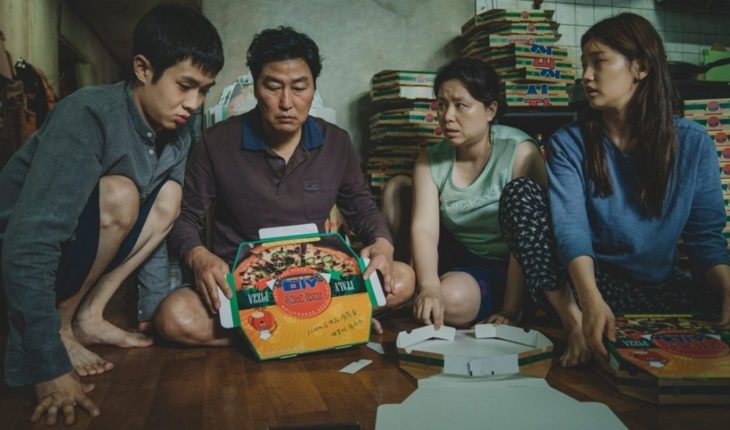The night of the 2020 Oscars was historic: for the first time a foreign film won the top prize thanks to “Parasite”, the South Korean film of Bong Joon Ho which was also crowned in categories such as “Best Director” and “Best Original Screenplay”.
The story portrays a family living in a basement located in the suburbs of South Korea who fail to get a job. However, everything changes when one of them starts teaching English in a modern and expensive Seoul home. In each scene, the film challenges, exposing a social and economic reality that transcends borders and allows to identify different societies. Is the situation you show about Korea real? How did the film impact the Asian country? What does the Academy distinction represent? In order to answer these questions, Filo.News spoke with Jasmine Sosa, an Argentine fellow at Kookmin University in Seoul, and Gabriel Pressello, a member of the Korean Cultural Center of Argentina.South Korea and the impact of the film
“I think it’s great that a Korean film is finally recognized internationally,” says Sosa, the first-person protagonist of the film’s premiere and repercussion. “There was a lot of talk about the film on the streets, in the nets everywhere. Although not the first of this, it was recognized by international film festivals and was given more relevance even in the local media as well,” he says. According to Pressello, the country’s reality is engulfed by the political and economic aftermath of the Korean War, back in the 1950s: “Korea came from being a devastated country, and being one of the five poorest countries in the world” Said. However, he acknowledged that in recent decades “living standards improved greatly,” although “many outstanding problems remain.” Just as estimated by the Organization for Economic Co-operation and Development (OECD), 48% of South Korea’s elderly live below the poverty line. At this point, Sosa explains that it is due to a retirement system that “does not favor everyone equally” as well as the country’s rapid and imminent growth, which caused “the elderly to be left out.” It is a country with a thriving economy, so there is work, things work, there is a general social welfare that is quite visible in everyday life. However, there is a reality and that is that above all older people are quite unprotected and are the ones that we can see the most in a situation of poverty or vulnerability in the streets”, says the professional.
For Sosa, today the positive aspects of the country are technology and security. “You can leave your computer, your cell phone, your wallet in a café, come back later and everything is intact. Likewise, I often saw cell phones lying on the floor on the subway and no one touched them.” Still, the young woman believes that “she still lacks further development of the human aspect, the empathy. In many respects it is as if, in infrastructure we are in the future in 2050, but in terms of relationships between people, the treatment of women is as if we were in the last century still.” In general here people live in a hurry, everything is very competitive, and they are always thinking about the future, the material, how much you have to work to buy the new cell phone, or a new car, or a house, etc. They don’t know how to enjoy the moment, or the little things (…) They’re not warm like us, they’re not going to hug you, however if you need help or you’re lost they always give you a hand,” Sosa explains.
On the other hand, he continues: “Not many people know the negative aspect, the issue of extreme competitiveness, the lack of opportunities. Here everything is governed by external elements, for example, at which university you studied. Here high school kids study more than 16 hours a day for the college entrance exam, which is why everyone is dying to enter ‘the best universities’ because that’s what their future depends on.” This aspect can be seen at the beginning of the film, when the teenager in the Ki-woo family reveals that he was unable to enter university, unlike his friend, Min-hyuk, who managed to get different trips and scholarships abroad after being accepted to study.” Another aspect I note that people don’t know is that while as I said before, it’s a very prosperous country economically, it’s hard to get a job and once you get it people are able to do anything to keep it. Here the issue of labour rights abuses is very common and that no one complains about (unpaid overtime, exploitation, etc.). It’s a tough country for both Koreans and foreigners,” he says. This aspect can also be seen in the film, specifically when showing the difficulty of the protagonist family to get stable work.
“The film is a harsh critique of the system of which everyone is a part,” Muses Sosa.
Despite the antagonism of realities between families, the film establishes a connection between them and a critique of the structural system that reproduces class division, lack of opportunity and social indifference. “It seems to me that the film’s depiction of different social classes is very accurate, personally, it was my turn to meet people on both sides,” Sosa believes, adding, “It’s a harsh critique of the system that everyone is a part of.” From Korea to the World: Why Was “Parasite” So Successful?
To date, “Parasite” was the winner of the Cannes Film Festival, at the Cannes Film Festival, critics’ Choice Movie Award and Golden Globes, at the Palm Springs International Film Festival, Hollywood Film Award and National Board of Review. What is the success of? In part, the masses that acquired the film in such a short time is linked to the use of all the marketing and advertising campaign that the cast of the film has done over the last few months, where it gave to speak on social media. However, it was mainly successful because it shows a reality that extends borders, which allows different societies to be identified. As Pressello, who explains: “The director portrays very well something that is a problem of Korea and a lot of countries in the world we are living in, a crisis of extreme inequality in capitalism, beyond the specific case of Korea it is important that he does beined in a problem. A little bit the success it had is because the problem is understood globally, it is not reduced to that country.” From films such as “Memories of Murder” or “The Guest,” the director is used to addressing social issues, a repetitive theme in that country’s film industry.” Koreans are quite self-referential in many ways and that is seen in their cinema. They talk a lot about them, their problems, their daily life, so maybe it’s something that comes to refresh a little certain formulas that in Hollywood we’ve already seen repeated is a very positive thing for cinema,” Pressello reflects. After all, the film will be the starting point not only to reflect on the current reality but also for many people to discover a world that was always there: “Korea has been proving that it has a world-class cinema for at least two decades , and that has nothing to envy of any film industry, both in commercial and entertainment cinema and in-house author cinema,” he concludes. In this note:





